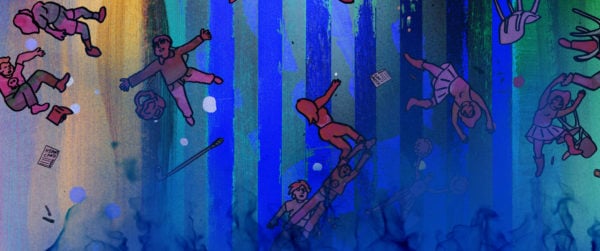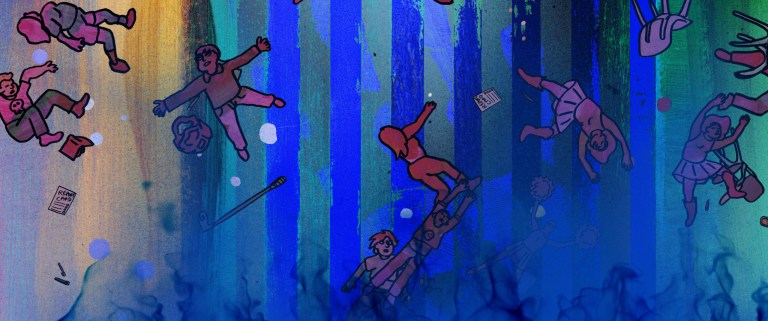
Whatever you think “My Entire High School Sinking Into the Sea” is, it isn’t what you think it is.
If you heard that “High School” is an animated film voiced by Jason Schwartzman, Reggie Watts and Lena Dunham and thought that it was a South Park-type comedy, it isn’t.
If you watched the first five minutes, saw a kid celebrate losing his acne over the summer by sitting farther back on the bus, and thought that “High School” was a coming-of-age story, it isn’t that.
Even if you heard that “High School” was the debut film of alternative comics darling Dash Shaw, noticed Dash named the protagonist after himself, and expected some trippy adventure like “Binky Brown Meets the Holy Virgin Mary,” “High School” also isn’t that.
“High School” is somehow both between and besides all those genres and tropes. Its erratic visuals, unpleasant characters and strained plot make “High School” difficult to watch at times. Even so, “High School” is a novel, meticulously crafted film that will speak to some people’s experiences like no other film before it has.
“High School” tells the story of Dash Shaw and his best friend Assaf, social rejects entering their sophomore year at Tides High School. They write the school paper with their friend Verti, but the rest of the student body is indifferent to both the paper and its writers. The trio literally can’t give the paper away.
Dash thinks they should sensationalize the paper, filling it with gossip, rumors and ghost stories. Assaf and Verti think they just need to research and write their stories more carefully. Things get complicated when Dash finds official documents stating that the school’s foundations are so unstable that even a slight earthquake would cause the cliffside school to tumble into the ocean. With Dash’s tabloid reputation, nobody will believe him.
Sure enough, an earthquake sends the school plummeting. Each floor of Tides High School corresponds to a different class – freshmen at the bottom and seniors at the top, naturally – and Dash, Assaf and Verti must climb through the floors and years of the flooding school to survive until rescue helicopters get to the school. They’re helped by friends they make along the way, including cheerleader Tina and Lunch Lady Lorraine, a “ninja goddess” in wait.
Saying I liked or disliked “High School” feels misguided. It’s clear “High School” wasn’t intended to be pleasant. The characters are crudely drawn against ornate pastel backgrounds, colored by paint-like textures. The film is preceded by a warning that it might trigger epileptic watchers, and that warning is eminently necessary. Its flickering, kaleidoscopic use of color is nauseating. The animation is crude and blocky, the characters are violently unlikable: Dash is insecure and self-obsessed, Assaf is passive but uncompromising, Verti won’t say what she means.
It’s not a good sign when Tina, the cheerleader voiced by Lena Dunham, is the most sympathetic character. She’s bitchy but ultimately well-meaning, harboring hidden depths. Still, it’s not clear why the audience should care whether even she lives or dies. Moreover, it isn’t clear if “High School” itself has a point. The plot is thin and confusing, and the many moments of metaphoric significance are never built on or even referred back to.
Those complaints voiced, I definitely left “High School” content that I had watched it. “High School” is unique, visionary and uncompromising. And as confusing as the film often is, it has some truly funny and touching moments.
As the group finally graduates from the sophomore floor, Tina shares that, “The most terrifying thing for me in gym was doing my first back bend… Eventually, I did it. I’d picture myself outside of my body, alone. So as I was bending, I’d imagine seeing myself leaning back and trusting that space between my hands and the floor. I’d just go for it.”
Illustrated by a fauvist projection, Tina’s story is as poetic a metaphor for growing up as any.
That so many big names collaborated on this weird indie movie suggests a massive faith in Dash and his project, and that faith was rewarded. “My Entire High School Sinking Into the Sea” may not be what high school was like for most people, but it was definitely what high school was like for Dash Shaw. It’s is the kind of movie most people will hate, but some people will truly love. So while the film might be better suited to museums than theaters, if you’re at all curious, I’d recommend seeing “High School” however you can.
Contact Allen Wu at nalkpas ‘at’ stanford.edu.
